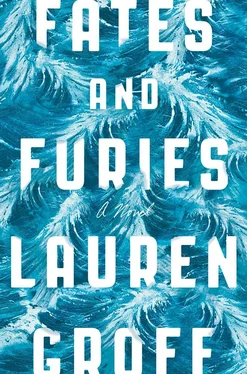—
AND THEN IT WAS HIS BIRTHDAY, the big forty, and he would rather have slept through the day, but woke to God shuffling off his chest where she slept and clattering down the stairs to Mathilde, who’d been up before dawn trying not to make a sound in the kitchen. Back door opened, closed. Soon enough, she was in the room, pulling his nicest summer suit out of the closet.
“Shower,” Mathilde said. “Put this on. Don’t complain. I have a surprise.”
He did, but it felt bad, waistband so tight it might have been a girdle. She bundled him into the car and they set off through the still-faint dew, illuminated by dawn. She handed him a hot egg muffin with excellent goat cheese, and tomatoes and basil from her garden.
“Where’s God?” he said.
She said, beatifically, with a great swoop of her arms, “All around us.”
“Hardeehar,” he said.
“Your puppy is with the neighbor’s girl and will return to us bathed and coddled and wearing tiny pink bows above her ears. Relax.”
He settled in, let the landscape pour all over him. This countryside, bled of humans, was entirely right for his mood. He dozed off and awoke to the car parking, a fine bright morning, a smooth lake, something that seemed like an excessive brown barn in the distance. His wife carried their picnic basket to the edge of the lake under a willow so old it no longer wept, just sort of bore its fate with thickened equanimity. Deviled eggs and champagne, vegetable terrine and Mathilde’s own focaccia, Manchego cheese and bright red cherries from their orchard. Two tiny black-bottom cupcakes, chocolate and cream cheese, his with a candle she lit.
He blew it out, hoping for something inexpressible. For something finer, more worthy of him.
Someone came around the building ringing a cowbell and Mathilde packed up slowly. He used his wife as his crutch as they crossed the meadow, all stubble and field mice, to the opera house.
It was cool inside, and around them there was a sea of whitehairs. “Beware,” Mathilde whispered in his ear. “Geriatrism. Contagious, mortal. Don’t breathe too deeply.”
He laughed for the first time, it felt like, in weeks.
The long, tender, non-chords of the strings tuning. He could listen to such anticipatory non-music for hours and leave this place feeling replenished, he thought.
The sides of the opera house began to slide shut against the day, the murmuring hushed, and the conductor came out and raised her arms. She shot them down to an upwelling of what? Not quite music. Sound. Astringent, strange, wild; and yet it slowly resolved itself out of cacophony into a sort of melody. He leaned forward and closed his eyes and felt the mildew that had grown itself over his being these weeks slowly wiped away by the sound.
The opera was called Nero. It was a story of Rome burning, but the fire was offstage, and this was not Nero the emperor, but a doppelgänger Nero, Nero the keeper of the wine cellars, who could have been the emperor’s twin brother, who lived in the palace below the king. It was less a story than a great creature surfacing from the deep; it was more sudden audible wave than narrative. It made Lancelot’s head spin. True recognition does this. Dizzies.
At intermission, he turned to his wife and she smiled as if trying to see him from a very high place. Watchful, waiting. He whispered, “Oh, M., I can barely breathe.”
—
OUT IN THE COURTYARD, stunned by sunlight, the soft, cool wind among the poplars. Mathilde fetched them sparkling water. Alone at a café table, a woman recognized him: this was happening more and more. He held a general taxonomy of faces in his mind and could usually place people within a second; not this woman. She laughed, assured him she didn’t know him; she had seen the profile in Esquire. “How nice,” Mathilde said, when the woman went off to the restrooms. “A little bug-zap of fame.” Of course, these were his people, theater people. It was to be expected that some of them might have known something about him, but still the woman’s starstruck blush had fed something hungry in him.
Contrails in the blue sky. Something beginning to break in him. A good breaking; not, this time, bone.
In the second act, the story was even more incidental, a tone poem; dancers emerged with rope to become the fire embodied. By the hot-iron gush on his tongue, he understood he’d bit his lip.
Curtain. Fin.
Mathilde put her cold hands on his face. “Oh,” she said. “You’re weeping.”
—
FOR MOST OF THE WAY HOME he kept his eyes closed, not because he didn’t want to see his wife or the green-blue-gold of the day, but because he couldn’t bear losing the opera.
When he opened them, Mathilde’s face was drooping. He couldn’t remember the last time he saw her without her smile. The light was such he could see the crazing in her skin by her eyes and nose, fine gray hairs in an electric fizz around her head.
“Medieval Madonna,” he said. “In gouache. Haloed in gold leaf. Thank you.”
“Happy birthday, friend of my heart,” she said.
“It was happy. It is. That opera changed me.”
“I thought it would,” she said. “I’m glad it did. You were getting to be kind of a drag.”
Spectacular burst of grapefruit as the sun burned itself out. They watched it on their veranda with another bottle of champagne. He picked God up and kissed her on the crown. He wanted to dance, and so he went in and put on Radiohead and swept Mathilde out of her chair with his strong side and pulled her to him.
“Let me guess,” Mathilde said, her cheek on his shoulder. “Now you want to write an opera.”
“Yes,” he said, breathing her in.
“You’ve never lacked for ambition,” she said, and laughed, and it was a sad sound, echoing against the flagstone and the flit of bats above.
—
NOW THE HOURS that he would have spent moping, watching voice-overed destruction or pinkish naked people working up a sweat, were passed in a frenzy of research. He spent an entire night reading what he could find about the composer.
One Leo Sen. Sen, surname South Asian, derived from the Sanskrit for army , bestowed upon those who did an honorable deed. Lived in Nova Scotia. Fairly new artist, having compositions performed for only about six years, fairly young. Hard to tell, because there were no images of Leo Sen online, only one CV from two years earlier and a smattering of praise for his work. The New York Times listed him as an exciting foreign composer; Opera News had a two-paragraph description of a work titled Paracelsus. There were a few audio clips of a work in progress on someone’s amateurish website, but it was from 2004, so long ago as to have possibly been student work. Inasmuch as a person can be a ghost on the Internet, Leo Sen had made himself into one.
Genius hermit, Lancelot pictured. Monomaniacal, wild-eyed, made mad by his own brilliance or, no, semiautistic. Burly beard. Loincloth. Socially incompetent. Savage at heart.
Lancelot e-mailed nearly everyone he knew to find out if anybody knew him. Not a soul did.
He e-mailed the festival director up at the opera house in the cow fields to see if she would give him contact information.
Distillation of her response: What’s in it for us?
Distillation of his: First pass on a possible collaboration?
Distillation of hers: You have my blessing, here you go.
—
SEPTEMBER? ALREADY? Leaves flaked off the trees. God grew a fluffy underlayer of down. Lancelot still had a hitch in his walk from his weakling leg. His narcissism so vast that it seemed the world itself had gone tentative and wobbly to mimic his body.
They’d gone to the city for the week, come home to the country for the weekend. At night, every night, he wrote a short e-mail to Leo Sen. No response yet.
Читать дальше












